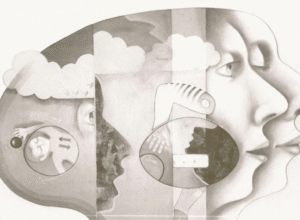1. A normalnie nie mogłaś?
Osoby przystępujące do in vitro zwykle mają za sobą długi czas nieudanych starań o dziecko. Często mierzą się z chorobami. Gdyby mogły zajść w ciążę bez in vitro, zapewniam, że zrobiłyby to w tej chwili. In vitro to wyjście dla osób, które „normalnie” nie mogły.
Samo określenie „normalnie” jest obciążające – przecież procedura in vitro doprowadza do normalnej ciąży. Samo zapłodnienie odbywa się w ten sam sposób, zarodki rozwijają się identycznie – tyle że nie w jajowodzie. Zamiast arbitralnych i ocennych określeń, jak „normalnie”, lepiej mówić o zapłodnieniu wspomaganym (medycznie), niewspomaganym (za pomocą stosunku, bez leków i zabiegów) bądź spontanicznym, ustrojowym (w jajowodzie) lub pozaustrojowym (w laboratorium). Wtedy nie oceniamy sposobu zapłodnienia, tylko opisujemy fakty.
Wiele ciąż nie zaistniałoby bez pomocy medycznej, jak zabieg wycięcia polipów, leki czy inseminacja. O większości takiego wspomagania nawet nie wiecie – leki brane w trakcie ciąży umożliwiają zdrowy rozwój płodu, ale mało kto nazywa przez nie ciążę „nienormalną”. Noszenia okularów też nie nazywamy „nienormalnym widzeniem”. Medycyna pomaga w wielu aspektach życia – i nie ma w tym niczego nienormalnego.
2. Kiedy będziesz w ciąży?
In vitro często przedstawia się jako „drogę na skróty”, gdzie medycyna daje pewność ciąży i terminu. „Zamawiała pani ciążę? Proszę”. Otóż nie. Tu niczego z całą pewnością nie można zaplanować. Na żadnym etapie.
Procedura pomaga przy procesie zapłodnienia – ale sam proces zagnieżdżenia i ciąży jest równie (albo bardziej, przez niepłodność) niepewny co przy staraniach niewspomaganych. Zarodek musi się naturalnie zagnieździć i zacząć rozwijać. To często nie następuje za pierwszym ani drugim razem. Nie tylko w in vitro: 60–70 proc. zarodków w naturalnym procesie jest wydalanych przez organizm. Nie da się z całą pewnością zaplanować momentu, w którym zarodek się przyjmie – ani z medycyną, ani bez niej.
In vitro nie daje pełnej kontroli nad całym procesem. Pomaga tylko w jednej jego części – przy zapłodnieniu. Ale także tu nie daje pewności – zdarza się, że po stymulacji i punkcji nie powstaje żaden zarodek. Nie można stworzyć zarodków samą chęcią i technologią. Tu dalej działa biologia.
W procesie in vitro trzeba pogodzić się z ciągłą niewiadomą. Gdy podchodziłam do niego w lipcu, myślałam sobie: „Może już w sierpniu będę w ciąży”. Jest listopad, a ja nie miałam jeszcze ani jednej próby zagnieżdżenia zarodka. Lekarz zdecydował się na zastosowanie tzw. długiego protokołu symulacji, który trwa wiele tygodni, potem są badania genetyczne zarodków i czekanie na wyniki, potem zrobiliśmy jeszcze jedną stymulację i punkcję – za każdym razem trzeba było od nowa czekać na okres, czyli początek cyklu. Tak minęły trzy miesiące.
Tydzień przed transferem, w którym zarodek miał być przekazany do mojego organizmu, lekarz w trakcie USG zobaczył nierówności na macicy. Transfer został natychmiast odwołany, mimo iż szykowałam się do niego od tygodni, brałam leki i wszystko było podporządkowane temu momentowi. Na ostatniej prostej dowiedziałam się, że zabieg będzie nie za tydzień, a najwcześniej za dwa miesiące. Mnie w międzyczasie czeka histeroskopia, w trakcie której usunięte zostaną polipy (jeśli tym są nierówności widoczne na USG, bo to także nie jest pewne). Cały miesiąc przygotowań na marne. Znów się cofnęłam, a proces wydłuża się o co najmniej dwa miesiące. I jak tu zaplanować, kiedy zajdę w ciążę?
Nie wiem. Po prostu nie wiem.
Na takie pytanie para w trakcie in vitro nie może więc odpowiedzieć. Może za to przypomnieć sobie wszystkie momenty, gdy nie wyszło. Jeśli jest po nieudanym zagnieżdżeniu lub poronieniu, samo pytanie może przynieść ogromny ból.
3. Dlaczego wybrałaś drogę na skróty?
Codzienne zastrzyki, szereg leków, zabiegów w znieczuleniu i setki badań to na pewno nie jest „droga na skróty”. „Drogą na skróty” jest prędzej bezproblemowe zapłodnienie w wyniku stosunku. Wiele osób zakłada, że in vitro trwa chwilę i od razu jesteś w ciąży. A to są miesiące, czasem lata. Nie zawsze się udaje. Rzadko udaje się po kilku tygodniach – a tym bardziej od razu.
4. Jesteś już w ciąży?
To pytanie zawsze jest niekomfortowe – niezależnie od tego, czy para stara się o ciążę z in vitro, czy w standardowy sposób. Jeśli osoba będzie chciała się tym z tobą podzielić, na pewno to zrobi. Jeśli nie, to takie pytanie tylko wprawi ją w zażenowanie, po czym najprawdopodobniej skłamie (zwłaszcza jeśli jeszcze nie ustalili z partnerem, że to ogłaszają). To decyzja pary, kiedy ogłosi ciążę, nie twoja.
5. Czyli jesteś bezpłodna?
Osoby podchodzące do in vitro często mierzą się z niepłodnością, tzn. z niemożnością zajścia w ciążę. Niepłodność w 30–40 proc. wynika z czynnika kobiecego, w 30–40 proc. z męskiego, a reszty nie da się ustalić. Jest wiele par, w których obydwie osoby mają zdiagnozowaną niepłodność.
Niepłodność to nie jest bezpłodność. Bezpłodność oznacza trwałą niemożność zapłodnienia, np. przez brak plemników, jajeczek czy macicy. Nie można jej naprawić ani cofnąć. Niepłodność jest wyleczalna – mimo niepłodności można spłodzić dziecko z własnych plemników i jajeczek.
Osoby z bezpłodnością także mogą być w procesie in vitro – zaadoptować zarodek, wykorzystać komórkę jajową lub nasienie innej osoby, jeśli nie wytwarzają jajeczek bądź plemników, a mają macicę. Wtedy mogą być w ciąży – dziecko genetycznie nie będzie ich, ale biologicznie jak najbardziej.
Większość par podchodzących do in vitro to jednak osoby niepłodne, a urodzone dzieci są ich dziećmi genetycznymi.
6. Dlaczego tak długo czekałaś z decyzją o ciąży?
Osoby, które podchodzą do in vitro, często są po trzydziestce, czasem po czterdziestce. Nie oznacza to, że dopiero co zaczęły starania o dziecko. Mogły się starać kilka bądź kilkanaście lat. Może lekarze wdrażali inne rozwiązania – zabiegi, leki, inseminację – nim dopuścili parę do in vitro.
Ciąża po trzydziestce nie jest niczym dziwnym – nasze mamy i prababki także w tym wieku rodziły dzieci. Średni wiek pierwszej ciąży w Polsce to 27 lat, w Unii Europejskiej – 29 lat. W Hiszpanii i Włoszech to już powyżej 30 (a wskaźnik dzietności i tak jest tam wyższy niż u nas). To stosunkowo późno – a jednak setkom tysięcy kobiet się udaje. Innym nie udaje się ani we wczesnej młodości, ani później.
Przy endometriozie, na którą sama choruję, już nastolatki mogą być niepłodne – to przewlekła, nieuleczalna choroba, niepłodność może być jednym z jej objawów.
Często z wiekiem choroby się pogłębiają, także te powodujące niepłodność – ale to przecież nie wina chorych, zwłaszcza jeśli latami nie miały dobrze postawionej diagnozy i odpowiedniego leczenia. Za to odpowiedzialni są lekarze.
Zrzucanie winy i odpowiedzialności za brak ciąży na osoby mierzące się z niepłodnością to prosty sposób na pogłębienie naszej krzywdy. My często same sobie to robimy – bez przerwy wyrzucamy sobie, że coś zrobiłyśmy źle. Zjadłyśmy na śniadanie gluten, stresowałyśmy się, raz opuściłyśmy siłownię, wkurzył nas znajomy – w naszych głowach wszystko potrafi stać się powodem, przez który nie zagnieździł się zarodek. Głosy z zewnątrz tylko nas dobijają. Zamiast oceniania bez wiedzy i świadomości – lepiej wesprzeć i być obok.
7. Natura wie lepiej, po co kombinujesz?
Nie, natura nie zawsze wie lepiej. Gdyby tak było, nie rodziłyby się dzieci z wadami letalnymi, które są skazane na niewyobrażalne cierpienie i szybką śmierć. A in vitro nadal podlega prawom natury – zarodek musi się rozwinąć, musi powstać blastocysta, następnie zarodek musi zagnieździć się w macicy i rozwinąć w płód. Do zapłodnienia z in vitro nie dojdzie, jeśli natura będzie „wiedziała lepiej” – ten proces podlega prawom natury w podobny sposób jak zapłodnienie w wyniku stosunku.
8. Nie boisz się, że dziecko będzie obrażane, że jest z probówki?
Dziecko będzie obrażane tylko wtedy, gdy tacy ludzie jak ty będą je obrażać. W samym sposobie powstania nie ma niczego obraźliwego ani poniżającego. To cud tworzenia życia i tak powinno być przedstawiane.
Dziecko powstałe dzięki in vitro nie jest „z probówki”. Jest z macicy, jak każdy z nas. W in vitro tylko zapłodnienie miało miejsce w laboratorium. Alternatywą wobec niego jest zapłodnienie w wyniku stosunku seksualnego i w jajowodach.
Skoro dzieci powstałe dzięki in vitro nazywa się „dziećmi z probówki”, to jak określać te powstałe bez wsparcia medycyny? Dziećmi z seksu? Dziećmi z wkładania penisa w pochwę? Dziećmi z frykcyjnych ruchów z użyciem genitaliów?
W „katolickim kraju” zapewne mogłyby dojść do tego kolejne określenia: dzieci ze stosunku pozamałżeńskiego, dzieci z nieprawego łoża. Kościół wiekami się w tym lubował. Zapewne nie chcecie, by wasze dzieci były tak określane. Dlaczego zatem hasło „dzieci z probówki” przychodzi niektórym z was z taką łatwością?
Dorośli nie radzą sobie z tematami tabu, jakimi są seks czy niepłodność. Powinni odrobić lekcje, zamiast obarczać konsekwencjami tego lęku i ignorancji dzieci.
9. Jak się czujesz z tym, że dziecko nie będzie twojego partnera?
To kolejna dezinformacja. In vitro postrzegane jest często jako decyzja wyłącznie kobiety. Czasem ludzie myślą, że to powszechny sposób na to, by kobieta „sama zaszła w ciążę”, bez poznania danych dawcy spermy. Zapewne mylą in vitro z inseminacją (która przecież także może odbyć się z użyciem nasienia partnera).
Program rządowy in vitro jest przeznaczony dla par mierzących się z niepłodnością. Większość podchodzących do procedury osób tworzy zarodki ze swoimi partnerami. Oczywiście, zdarza się, że plemniki są od kogoś innego – gdy partner nie wytwarza swoich. Ale to nie jest ani najczęstsza, ani najbardziej oczywista droga. Poza tym partner w tej sytuacji jest pełnoprawnym ojcem – bo wychowuje dziecko i je kocha.
Program rządowy in vitro wyklucza samodzielne kobiety, które chcą mieć dzieci. Inna sprawa, że tak nie powinno być. Ale póki co finansowane in vitro z pewnością nie jest dla tych, które chcą mieć dziecko bez partnera.
Zakładanie, że in vitro to decyzja wyłącznie kobiet, jest przede wszystkim krzywdzące wobec mężczyzn, którzy również uczestniczą w tym procesie: wyrażają zgody na poszczególne etapy, mają robione badania, wykorzystywane jest ich nasienie. Przeżywają powstawanie zarodków i porażki tak samo jak kobiety. Tak samo pragną zostać rodzicami.
10. Jak się czujesz z tym, że aby powstało jedno dziecko, inne muszą umrzeć?
Olbrzymią rolę w nakręcaniu tej dezinformacji gra Kościół rzymskokatolicki, który wprost nazywa in vitro częścią „cywilizacji śmierci”.
Proces, w wyniku którego rodzą się dzieci i powstają nowe życia, Kościół określa „śmiertelnym”. Zaprzepaszczenie wierzącym parom możliwości tworzenia życia przez zabronienie im korzystania z in vitro zapewne jest bardzo „pro-life”.
Księża opowiadają o „śmierci” zarodków czy nawet dzieci. W trakcie in vitro nie umierają żadne dzieci, zarodki nie są narażane. Wręcz przeciwnie – dba się i chucha na każdy zarodek, a potem płód, bo są najcenniejsze dla osób, które latami nie mogły zajść w ciążę. Tym bardziej bzdury głoszone przez Kościół są dla takich par bolesne.
Niektóre zarodki nie rozwijają się lub nie zagnieżdżają – tak samo jak w procesie naturalnym. Wtedy są wydalane – decyduje o tym biologia (lub Bóg, jak widzą to księża). Dla osób w trakcie in vitro ten moment potrafi być traumą, jak poronienie. Ale Kościół ma to gdzieś i je dobija, oskarżając o „morderstwa”.
Osoby z niepłodnością dbają i walczą o każdy zarodek. Natura czy też Bóg – nie. Ani Kościół, skoro decyduje się atakować osoby w trakcie in vitro, od lat poniżając i obrażając je publicznie. Stres może spowodować niezagnieżdżenie się zarodka lub poronienie. Najwyraźniej Kościół nie ma problemu z narażaniem zarodków czy płodów na śmierć – ani z oskarżaniem o to bezpodstawnie innych.
To oni są cywilizacją śmierci.
Jeśli jednak mimo nagonki prowadzonej w Polsce przez księży uda się zajść w ciążę w wyniku in vitro, to zarodki, które nie zostaną wykorzystane na tym etapie, para może wykorzystać w przyszłości. Większość par planuje dwoje dzieci. A jeśli ktoś nie chce kolejnego – zarodki i tak nie ulegają zniszczeniu. Są przekazywane innej parze – takiej, która nie może wytworzyć własnych. To tzw. adopcja zarodków. Pozwala na zajście w ciążę osobom, które nie mają plemników i nie wytwarzają jajeczek. W Polsce nielegalne jest niszczenie zarodków.
Innym mitem powielanym przez Kościół jest „aborcja selektywna”. Miałaby następować, gdy w wyniku in vitro pojawia się ciąża mnoga i „wybiera się” jeden płód kosztem innego. To również nie ma miejsca w Polsce – aborcja w takiej sytuacji jest nielegalna.
Żadne dziecko nie umiera w wyniku in vitro. Ta dezinformacja jest jednak wyjątkowo obciążająca – sprawia, że ludzie, którzy często latami starają się o dzieci i chcą zapewnić im najpiękniejsze życie, zrównywani są z mordercami. Nazywanie ludzi starających się o dzieci mordercami to zniesławienie, za które Kościół i każdy oskarżający w ten sposób powinien odpowiedzieć karnie. W demokratycznym kraju nie można niewinnych ludzi pomawiać o zbrodnie. Oby dla propagatorów takiej narracji skończyło się to wyrokami więzienia. Terroryzowanie przez Kościół dzieci i niepłodnych par marzących o dzieciach musi się skończyć.
**
Dziękuję Stowarzyszeniu Nasz Bocian za merytoryczne sprawdzenie tekstu.

 Wspieraj
Wspieraj 

 Wspieraj
Wspieraj  Wydawnictwo
Wydawnictwo 
 Zaloguj się
Zaloguj się 
















